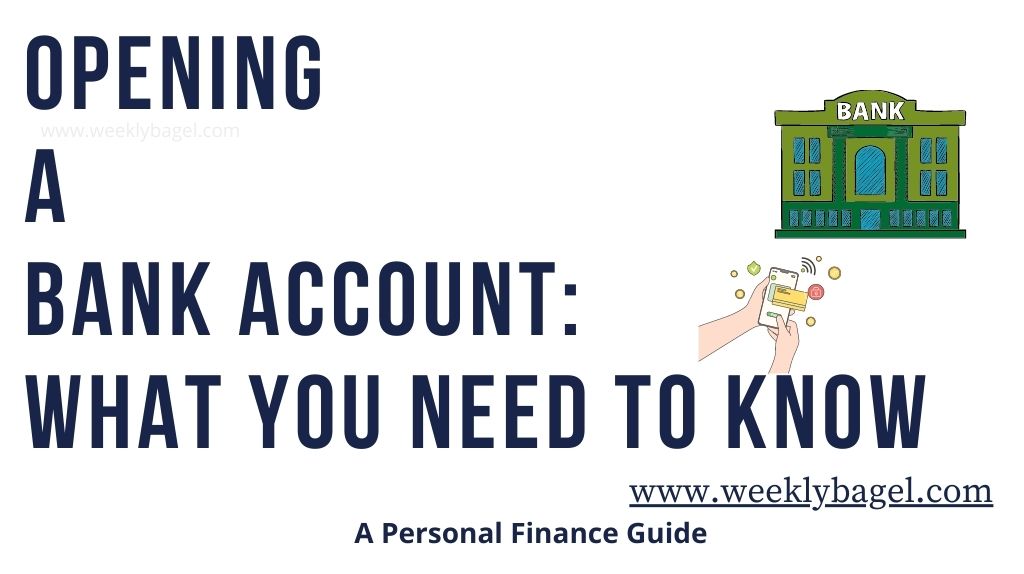
In the functioning world of working class adults, one cannot do without a bank account. Not only do you need it to save money, but also you need it to send or receive money. In fact, it is difficult to perform most monetary responsibilities without a bank account.
The first time opening a bank account is quite easy, as long as you meet the requirements. Different banks have different requirements. Also, different banks have different services and customers they provide to.
Before you open a new bank account, your financial needs dictate what kind of bank you need. This is because there are different kind of banks with varying services in the United States.
What To Look For In Your First Bank Account
As mentioned earlier, your needs dictate the kind of bank you want to go for. If your goal is to save money, then a bank which caters to small businesses will not serve you well. So, it is always a good idea to align your financial goals with banks which serve them well.
Different Kinds Of Banks And their Services
Here are the different kinds of banks and the services they provide:
1. Credit Unions
What is a credit union account, my good reader?
Credit Unions are financial institutions, which provide the same banking services as traditional banks. However, they are not-for-profit institutions owned by members. What this means is, any profit from their services is reinvested in making the financial lives of their members easy.
Often, this comes in the form of lower interest rates or fees as compared to banks. For you to use their services though, you have to be a member. You can be a member by either applying to a credit union.
Advantages Of A Credit Union
Here are some advantages of credit unions.
- Credit unions will offer a higher return on your savings deposits.
- Also, their interest rates on loans, credit cards or mortgages are lower than banks.
- You are a shareholder of any credit union you sign up with.
- Your money is NCUA-Insured. In case of bankruptcy, up to $250,000 of your money is insured.
- Service fees are lower than banks too.
- Less requirements to open an account.
These are what makes credit unions better than some banks. They have a few disadvantages though.
Disadvantages Of A Credit Union
These are the disadvantages of a credit union.
- A credit union is not nationwide like most traditional banks. Its location and branches may be within a county or a city.
- You need membership to use its services.
- Its services may be limited as compared to banks.
Currently, I use credit union because I like the interest rates. When I first moved to the United States, I opened an account with a bank which kept charging me monthly fees for maintaining a checking account. A credit union is highly recommended for first time bank account holders, who are looking for lower bank fees and a high saving interest yields.
2. Banks
Traditional Banks are financial institutions, which are set up for profit while providing banking services to their customers. Unlike a credit union, they may have nationwide branches. And, they provide a wide range of services.
What advantages do banks have over credit unions
Here are the advantages of banks over credit unions, when considering opening a bank account.
- You do not have to be a member to use a bank’s service, since it is a for-profit financial institution.
- Banks have more branches. Some banks have nationwide branches.
- They have more services than credit unions. This includes financial products, ATMs and other banking services.
- Banks have great online and mobile banking systems. Not sure whether bank’s system is better, because I like my credit union’s online and mobile banking systems.
- Banks are FDIC-insured.
Earlier, I mentioned credit unions are insured by NCUA. Both NCUA and FDIC insure your money. While FDIC insurance is backed by the United States government, NCUA is an independent agency created by the federal government to insure credit unions. Do not worry about this, because NCUA can insure up to $250,000 of the money in your bank account when your credit union goes bankrupt.
Cons Of Opening A Bank Account Over A Credit Union Account
Banks offer significantly wide services than a credit union, but here are its disadvantages for a first time bank account holder.
- Banks have higher fees than credit unions.
- Some bank accounts charge you to maintain a checking account.
- Lower saving interest return.
- Higher loan interest fees.
With that said, which kind of bank is best for a beginner?
Well, it depends on what your financial needs are. If your goal is to have access to a wide range of financial products, the convenience of ATMs and locations wherever you go, then a bank is great for you. I would advise going for a bank with no monthly fee.
Now you know what to consider when choosing a bank, here is what to know about the different bank accounts available to you from banks and credit unions.
The Different Types Of Bank Account
There are different types of bank accounts. Each is tailored to meet your needs. Setting up your first bank account, requires you know which bank account is good for you. Or else, you will not reach your goal.
Here are the common bank accounts available in a credit union and a bank for any beginner.
1. A Savings Account
A savings account is a interest-bearing bank account, which allows you to save money. This is an account meant for customers, who want to put away their money for a while. Interest rates on a savings account is better than other kinds of account.
A savings account allows limited withdrawals. This is one of the benefits of a savings account. Limited withdrawals prevent you from spending a lot.
Opening a savings account requires the money you put in it, is not for immediate use. To simplify, opening a savings account is great for short-term saving goals. You can read more about this on How Savings Account Work In the US.
Otherwise, the next kind of bank account below is great for your savings.
2. Certificate Of Deposit Account (CD Account)
What is a CD Account?
It is a bank account, which is above a savings account. Its goal is solely for savings. A CD account lets you loan your bank money for a specific interest rate and time.
Here is what I mean, my dear weeklybagel reader.
Let us say you have $5000 sitting in your account. If your bank offers a CD account at a 3% interest rate, you can put the $5000 in the account for a period of time and earn the interest rate on it. This is until the end of the agreed time.
Want to know the best part?
You will always get your money and accumulated interest back. From the example we used above, you can get $10,600 in two years at 3% interest rate.
Finally, any money which you put into a CD account cannot be withdrawn until the end of the agreed time. Just letting you know. This type of account is purely for savings. You can read what is certificate of deposit for more information.
3. Checking Account
What is a checking account?
A checking account is a transactional account. It is also called a current account. Opening up a checking account is the easiest bank accounts to open. This is because it is the simplest type of bank account offered by a bank or credit union.
It lets you deposit and withdraw money whenever you want. This is one of the reasons for having a checking account.
The best features of a checking account include checks, credit cards, debit cards and other banking products. You will have access to all of these. This is because the account is created for your every day money transactions.
Disadvantages Of Using Checking Accounts
Here are some disadvantages of this simplest type of bank account.
- A checking account has no interest. Money in this kind of account will not accrue interest.
- There may be a monthly fee to maintain one. It depends on the bank, so be sure to ask before opening a checking account.
- You may be required to keep a minimum balance on it.
Be sure to ask for the bank about the above, before opening a bank account. This is to avoid future fees, which you were not aware of it prior to opening up a checking account.
There are other kinds of bank accounts, but the ones above are what you need to concern yourself with. As a beginner trying to set up a bank account, you need one which will either help you save or perform daily monetary transactions with ease. Hence, what I have laid out here for you.
What You Need To Open A Bank Account
What do you need to open a bank account, good reader?
The requirements to open a bank account is meeting banking eligibility. Here are what banks in the United States need from you to open a bank account.
- Your social security
- A legal form of identification. Your driver’s license, green card or passport can suffice.
- A minimum deposit for a bank account. Usually, this could be free or $25. The amount depends on your bank of interest.
- A birth certificate. This is only for a minor trying to open a bank account with a legal adult guardian or parent.
Here are other things you need to know.
The Age Limit For Opening & Maintaining A Bank Account
Can a minor open a bank account?
Yes, you will need a legal guardian to do it. When one is opened for you as a minor, it comes with restricting conditions. This is because it is believed a minor is not financially responsible yet.
The age for opening and maintaining a bank account independently is the age of eighteen. This is because you are considered an adult. By then, you are expected to be working or have financial responsibilities.
The final step to open a bank account is to be financially responsible first. A bank account can incur a lot of debt for you, when you do not know how to manage your bank account. Did you know about this?
This is especially in situations, where you sign up for a bank account or a bank product with monthly fees. You can create one hell of a huge debt mess by being financially irresponsible. I need you to think about these things, before opening a bank account for the first time.
NOTE: You could read the following on opening a new bank account at Chase bank.




 Getting Out Of Debt In 2023: 5 Easy Steps
Getting Out Of Debt In 2023: 5 Easy Steps